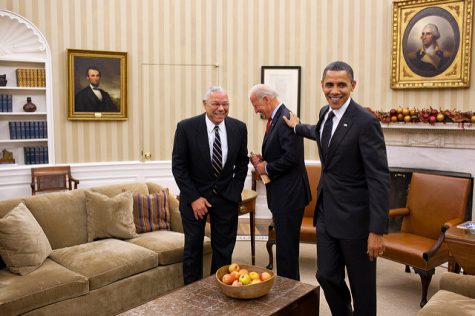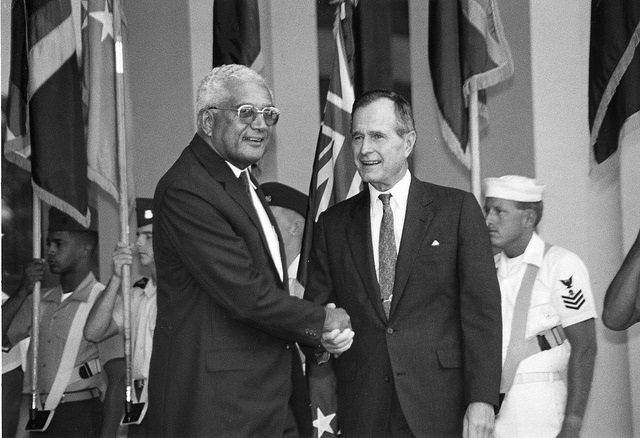Party loyalty and political values clash leading up to 2016 election
(East-West Center/Flickr)
Former Lt. Gov. of Maryland Kathleen Kennedy Townsend announced last month former President George H.W. Bush will vote for Hillary Clinton in the upcoming presidential election.
According to Townsend, Bush revealed his voting plans to her during a phone conversation.
It is widely known that Bush lost the 1992 general election against Bill Clinton. Despite Bush’s loss, it seems there were no hard feelings.
In fact, an unlikely friendship blossomed between the two.
In previous elections, Bush endorsed his son, George W. Bush, John McCain, and Mitt Romney. Bush’s personal ties to the Clinton family may lead some to speculate as to whether their relationship is driving his decision to vote for his friend’s spouse.
But perhaps, it is instead Donald Trump’s deviation from traditional conservative values that is driving him to vote for the opposing party. After all, Bush is not the only politician to gouge party lines in presidential elections.
Former Secretary of State Colin Powell notoriously proclaimed he would vote outside his usual Republican partisanship in favor of President Barack Obama in 2008.

Powell referred to Obama as a “transformational figure.” In explaining his decision to endorse the former Illinois senator, Powell proclaimed the Republican Party had “moved more to the right than I would like to see it.”
Powell’s 2008 remarks reflect an attitude that is rare in politics today. Though Obama was in the opposite party as he was, Powell felt that Obama was the better choice to suit his individual political views.
Ted Cruz, former presidential candidate and current Texas senator, initially refused to endorse Trump at the Republican National Convention in July. Understandably, Cruz has every right to make his own decision on an endorsement to Trump.
After all, Trump made harsh remarks regarding Cruz’s wife Heidi and his father Raphael.
In spite of his apparent disdain for Trump, Cruz announced Sept. 23 that he plans to support Trump in the general election.
Cruz’s backing of Trump illustrates the national pressure to remain partisan. Bush and Powell’s surprising declarations shatter party loyalty.
The shock value of these endorsements — Cruz’s endorsement for Trump, Bush’s apparent Clinton endorsement and even Powell’s support for Obama — highlight a more significant problem that we are facing today: Polarization.
Polarization, a sharp division in a population, is one of the most defining features of American politics today. The Pew Research Center, a nonpartisan think tank, has chronicled this issue for years.
According to a 2014 study titled “Political Polarization in the American Public,” the number of Americans who identify as far-right or far-left has nearly doubled in the past two decades.
In the same study, participants were asked about their feelings about the opposite party. It was also found that “partisan animosity” has doubled since 1994.
The dissension between the Democratic and Republican parties makes voting across party lines unimaginable, regardless of how the party may view their nominees. Because of the pressures of party loyalty and the hyperpolarization of political parties in the U.S., high-profile political figures are still reluctant to endorse another party.
This is an issue many Republicans are facing this election season, and it is changing paritsanship as we know it.
Email Amy at [email protected] or follow her on Twitter @AmyFRusses.

"The greater our knowledge increases the more our ignorance unfolds."










